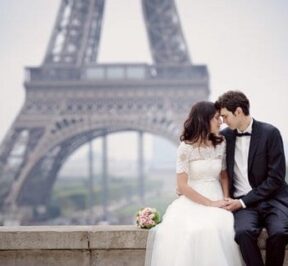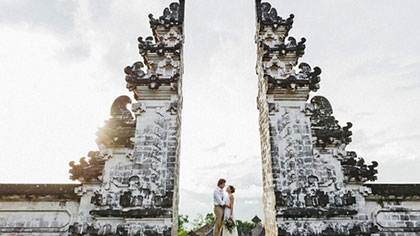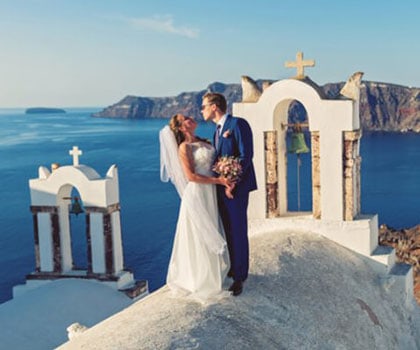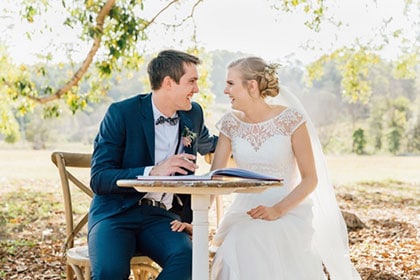
Sep 01
Мarriage Abroad in Foreign Country – Wedding Ideas Law Blessing Gay
Мarriage in Scotland
Gretna Green has over the years acquired an aura associating it with runaway marriages and elopements, as it is the first place over the Scottish border and Scotland’s regulations on marriage are not as restrictive as those of England and Wales. Scotland was outside the scope of the 1754 Marriage Act that governed the other countries; at one time it was possible to marry in Scotland simply by a declaration before two witnesses, but their laws have now been tightened up considerably and are bound by the Marriage (Scotland) Act of 1977.
You may marry in Scotland provided that you are 16 or over; if you are under 18 you do not need to have the permission of your parents or guardian. You can be married by a registrar or assistant registrar in the registry office, or you can be married by any clergyman, parson, priest or officer of any religious denomination who is entitled to undertake marriages according to the 1977 Act. Whichever type of wedding you choose, you must have two witnesses present who are over 16. Banns are not necessary for Scottish church weddings, and the minister has wider discretionary powers than he does in England and Wales; for instance, he may be willing to many you in your home or at a hotel.
The couple must each obtain a marriage notice form from a registrar in any location; when the forms are completed they must be returned to the registrar for the district where the wedding is to take place. This must be done not more than three months and not less than 15 days before the ceremony; the norm is about a month. When the forms are returned you will both have to produce your birth certificates; if either of you has been married before you will also have to show the former spouse’s death certificate or a copy of the divorce decree. If either of you is living out of the United Kingdom you will have to declare that there is no legal reason within the regulations of your own country why you cannot be married. If any of the documents are in a foreign language you will need to produce a certified translation.
The registrar will then prepare a marriage schedule. If you are getting married in the registry office they will keep the schedule; if you are getting married in a church or elsewhere one of you must collect the schedule not more than a week before the wedding. After the ceremony the schedule must be signed by both partners, both witnesses, and whoever conducted the wedding; it must be returned to the registrar within three days so that the marriage can be registered.
Мarriage in Northern Ireland
In Northern Ireland you must give notice of marriage to the District Registrar of Marriages. The residential qualification is seven days, and marriage can take place by licence, special licence, banns, certificate from a registrar, or licence from a District Registrar of Marriages. Notices issued in Northern Ireland or Scotland are valid in England and Wales and vice versa, but marriage in a registry office in England or Wales is not possible when one of the partners lives in Northern Ireland or Scotland.
Мarriage in Channel Islands
The Channel Islands are part of the Diocese of Winchester, and the regulations for marriage in church are the same as for the rest of the country.
Jewish and Quaker weddings
Jewish and Quaker weddings have been outside the jurisdiction of the regulations surrounding the Anglican ceremony since the Marriage Act of 1754; these ceremonies may be conducted in the home if wished, but only Jewish weddings may be conducted out of doors.
Marriages abroad
If you are to be married abroad it is vital to find out in advance what documents you will need in order to qualify as legally able to marry. Check carefully any regulations relating to age of the partners, remarriage of divorcees when the partner is still living, proof of residence, proof of no criminal convictions, religious requirements, etc. The exact requirements will vary with the country where the marriage is to take place.
Marriages entered into abroad are generally held to be valid legally in Britain provided that they were valid legally in the country where they took place, and provided that none of the prohibitions of British law (for instance regarding age, kinship, etc) were infringed. British law only recognises monogamous marriages.
Getting Married Abroad
If you fancy the romance of marrying in a foreign city, on a beach, or with a backdrop of mountains, why not opt for a wedding abroad? This will probably mean you have fewer guests, which may make it less expensive, depending on your travel costs, and you can hand over the organizing to specialist companies that arrange weddings abroad. The weather may also be more reliable and you can combine it with your honeymoon. Unfortunately, unlike our hettie friends, you can’t just pack your bags and pick a destination.
If you decide to marry abroad and you want your relationship to be recognized as a civil partnership in the UK, you need to check if the country where you want to marry is listed in schedule 20 of the Civil Partnership Act, since these are the countries the UK recognizes.
The legal requirements and procedures for marriage differ from one country to another. It is, therefore, important to establish exactly what is required for your intended location. Many leading tour operators offer a comprehensive wedding package and have a Wedding Department to assist you with all the necessary arrangements. They will request a minimum of 70 weeks to process all the paperwork. Civil partnerships may take place abroad providing the country has existing legislation for such partnerships. You should contact the Consulate/Embassy for the relevant country for advice on what documentation will be required or contact your local register office for further information.
The Necessary Documents for Мarriage
All resort authorities require English language documents. If yours are in another language, you should have them officially translated and take the translation with you as well as the original documents. Some countries ask for birth certificates, divorce documents and death certificates to be ‘legalized’. This can be done through the Foreign and Commonwealth Office (FCO).
You will need to ascertain from the tour operator which of the following you require for your chosen location:
• passports
• birth certificates
• Decree Absolute if divorced
• death certificate if widowed
• proof of change of name by Deed Poll
• parental consent (depending on your age)
• adoption certificate
• passport photographs
• photocopies of documents prior to travel
• all original documents to be taken out to resort
• translations of foreign documents to be taken out to resort.
• Additional Requirements
Your tour operator will be able to advise you if any special requirements apply to your chosen destination. These may include obtaining a letter prepared by a Notary Public stating that you are free to be married or obtaining an Affidavit to prove single Status.
It is advisable to obtain two copies of the marriage certificate at the time of your marriage.
Some countries require a Certificate of No Impediment. This is used for persons marrying in a foreign country where one of the parties is British and the other is a foreign national. Advice can be sought from a Superintendent Registrar or the Foreign Office.
A Superintendent Registrar may accept notice for a marriage to take place in a foreign country between a British subject and either a foreign subject or another British subject. He/she will be able to issue a certificate that can be produced to help the procedure abroad. However, the rules vary and you should consult the Superintendent Registrar.
Where a marriage is solemnized in a foreign country under local law, it is sometimes possible for a record of the marriage to be made under the Foreign Marriage Order 1970. This is not always the case and you should consult the Superintendent Registrar for more details.
Main Checklist For Getting Married Abroad
• Decide if it is appropriate to consult a Superintendent Registrar
• Decide how you wish to book your wedding /travel agent, holiday Company, website/
• Set a provisional budget
• Discuss whether you will get married and take your honeymoon at the same destination or different ones
• Identify suitable destinations
• Establish the required period of residency before the ceremony can take place Usually 3-5 working days
• Decide on length of stay (allow for period of residency and to complete the legal formalities)
• Decide if you wish to invite any family and friends to attend the ceremony
• Consider whether you wish to have a church Service of Blessing
• Discuss your requirements with the tour operator. If they offer a wedding package, ascertain what is included and the cost:
• wedding insurance to cover your wedding attire being lost or damaged, your photographs needing to be re-taken, etc.
• transportation costs to the resort authorities
• Marriage License and Certificate
• Services of the Registrar
• wedding cake
• hors d’oeuvres
• sparkling wine or Champagne
• bouquet, buttonhole, additional flowers and decorations
• musicians
• photographs and video.
Civil Ceremony at Мarriage
• The choice of venue is yours as you can get married at any register office. Obtain addresses from local authorities, telephone directories or the Internet.
• Identify the register office of your choice
• Telephone the register office to provisionally book the ceremony /This can be arranged up to 12 months in advance/
• Call in person at the appropriate register office(s) to give notices of your intentions to marry and to pay the fees for giving notices. It will be necessary to produce evidence of identity for both parties
• Make an appointment with the Superintendent Registrar to discuss the following details:
• confirm the date and time of ceremony
• how many guests can be accommodated
• type of ceremony – Standard or enhanced with the addition of extra slightly religious declarations or poetry readings of your choice
• the policy on playing appropriate music of your choice providing it has only slight religious connotations
• the possibility of including the bride being ‘given away’
• the policy on confetti, photography and video recording
• the possibility of having the ceremony broadcast live on the internet and the cost
• Provision of flowers /a silk flower arrangement will be provided or you can arrange to supply your own flowers/
• location and quantity of parking space for guests’ cars
• amount of fees and details of payment
• obtain signature on the necessary form if you wish to change the name in your passport before the wedding
• Choose at least two adult witnesses (this is a legal requirement)
• Decide whether you wish to have a church Service of Blessing, either directly after the marriage or on another day
Approved Premises For Civil Ceremony at Мarriage
Many stately homes, prestigious buildings, Hotels and restaurants – all of which make great backdrops for your wedding photographs – are licensed to hold weddings. You can obtain details of approved venues from local register offices or on the Internet. Decide whether you prefer to have just the ceremony or both the ceremony and reception at the venue
Identify approved venues in the required area
Enquire whether they offer facilities for the wedding alone or both the wedding and reception
Establish compatibility of venue with proposed style of wedding
Request brochures and prices
Ascertain their hire charges for the room(s) and whether they offer exclusive use of the venue and the cost
Establish availability /date, time, room(s) depending on the number of guests/
Choose at least two adult witnesses (this is a legal requirement)
Decide whether you wish to have a church Service of Blessing, either directly after the marriage or on another day
Checklist ‘Civil Ceremony’ – Approved Premises (Cont.)
Venue
Address
Telephone Fax
Email Website
Contact
Date of ceremony Time
Room for ceremony
Room(s) for reception
Number of guests
Other ceremonies on the same day
Flowers
Policy on confetti
Car parking
Hire of room(s)
Exclusive use
Flowers
Total
Deposit £ Date paid
Balance £ Date paid
Date of confirmation sent/received
Superintendent Registrar Registrar/CPO
Extra declarations or poetry readings
Music of your choice
Policy on photographs/video
Witnesses 1 or 2
Service of Blessing □ Yes □ No
Service Of Blessing at Мarriage
A Service of blessing is sometimes held after a civil ceremony or following marriage abroad. The Church of England calls this ‘An Order for Prayer and Dedication after a Civil Marriage’. It can take place directly after the marriage or on another day, including a Sunday. The Service can include hymns, prayers, readings, etc., but there is no exchange of vows.
Make an appointment with the church officiant to discuss the following details:
ceremony date and time
content and order of Service
bell-ringers, Organist and choir and the relevant cost
suggest a meeting with the organist and obtain a contact telephone number
check if there are any other ceremonies on the same day
flowers and who will provide them /Some churches provide flowers and you may wish to state a preference for the type and color. Ascertain whether you will be required to contribute towards the cost/
permission for photography and video recording
amount of church fees and details of payment
date for a rehearsal, if required
Make an appointment with the Organist to discuss the music
Make a sketch of the inside of the church if required by the photographer, videographer, etc.
Ascertain location and quantity of parking space for guests’ cars
‘Service of Blessing’ Checklist
Church
Officiant
Address
Telephone Fax
Email Website
Date of ceremony Time
Musician(s)
Singer(s)
Organist
Telephone
Other Services on the same day
Flowers
Policy on photographs/video
Date of rehearsal Time
Church Fees
Officiant £
Organist £
Choir £
Bell-ringers £
Video recording Copyright £
Total £
Details of payment
Musician(s) £
Singer(s) £
Flowers £
Booking Аrrangements at Мarriage
• Booking the Superintendent Registrar
• Telephone the register office to provisionally book the Superintendent Registrar /This can be arranged up to 12 months in advance/
• Call in person at the appropriate register office(s) to give notices of your intentions to marry and to pay the fees for giving notices. It will be necessary to produce evidence of identity for both parties – see ‘The Necessary Documents’ above
• Make an appointment with the Superintendent Registrar to discuss the following details:
• confirm the date and time of ceremony proposed venue
• number of guests attending
• type of ceremony – Standard or enhanced with the addition of extra slightly religious declarations or poetry readings of your choice
• the policy on playing appropriate music of your choice providing it has only slight religious connotations
• the possibility of including the bride being ‘given away’
• the policy on confetti, photography and video recording
• amount of fees and details of payment
• obtain signature on the necessary form if you wish to change the name in your passport before the wedding
Booking a venue for your Мarriage
Make an appointment with the Venue Manager to discuss your requirements:
• confirm the date and time of ceremony
• number of guests attending
• ask whether there are any other weddings on the same day
• check on easy access for any elderly or disabled guests
• provision of flowers /Specify the type and color if you wish the venue to provide them or you may prefer to ask your own florist/
• the policy on confetti
• location and quantity of parking space for guests’ cars
• discuss the estimated cost and ascertain whether VAT is included
• request a detailed estimate in writing
• Confirm acceptance in writing and enclose the required deposit
• One week before the wedding
• telephone or call round to check the final arrangements
• confirm the final number of guests
Gay Marriage Planner
If you decide to marry abroad and you want your relationship to be recognized as a civil partnership in the UK, you need to check if the country where you want to marry is listed in schedule 20 of the Civil Partnership Act, since these are the countries the UK recognizes. The Schedule should be automatically updated as and when various countries change their laws on same-sex unions; however, this is not always done immediately so you should double-check. The best place to stay up to date with which countries have some form of civil union for same-sex relationships is in Wikipedia – Same-sex_marriage.
Countries where some form of gay civil union can take place are: Andorra, Argentina, Belgium, certain parts of Brazil, Canada, Colombia, Czech Republic, Denmark, Finland, France, Germany, Iceland, Israel, Luxembourg, Mexico, Netherlands, New Zealand, Norway, Portugal, Slovenia, South Africa, Spain, Sweden, Switzerland, Tasmania, and certain US States.
In the US, New Jersey, Vermont and Connecticut offer civil unions, and California offers domestic partnerships with benefits similar to civil unions. Massachusetts is the only state to allow same-sex marriages. Even in countries where you are allowed a same-sex marriage, such as Canada, it will be considered only as a civil partnership in the UK. Bear in mind that there may be restrictions within each country about residency requirements. Vermont, Canada and New Zealand are the easiest places to organize the legal ceremonies, as the paperwork can all be done in advance. Vermont is particularly easy since there is no residency period requirement after you arrive in the state, making it ideal for couples who want to elope.
In Canada, it is best to opt for the provinces that offer a ‘marriage’ as opposed to those which have a ‘union civile’ – these come under French law and have a residency period requirement of around 30 days. Danny Waine, of travel agent Perfect Gay Honeymoons, says it is much more difficult in European countries other than the UK. ‘Although the UK will recognize the overseas relationship on return, the laws of other European countries require one of the partners to be a resident of that particular country. Spain is slightly different – if you own a property there, you can marry anywhere in the country.’
You also need to check out what kind of celebration you are allowed in each country. In Slovenia, for example, the authorities don’t allow any guests or ceremony – you just sign a document. The first two gay men to enter into a civil partnership in Slovenia, Mitja Blazic and Niki Kern, called the ceremony ‘humiliating’, saying it was more like a car registration than a wedding ceremony. If you have any questions about registering a civil partnership abroad, you should contact the Embassy or High Commission of the country concerned. You may be asked to obtain a certificate of no impediment. This is a document required by some foreign authorities to enable a British national to register a civil partnership in their country and, under certain circumstances, it can be provided by your local registry office.
Once you have tied the knot abroad, you can apply to have your overseas civil partnership documents – with translations, if necessary – sent from the country where it took place and deposited with the General Register Office in the UK. This is a good idea, in case you ever need a copy.
Two conditions apply: Your civil partnership has to have taken place in one of the countries listed in Schedule 20. One of you must be a British citizen – and only that person can apply to deposit the details. For further information, contact the Foreign and Commonwealth Office (FCO).
Special circumstances: Members of the Armed Forces can register civil partnerships overseas where a Service Registering Officer is able to offer this service. Currently, this is possible in Australia, Canada, the Falkland Islands, Germany, Gibraltar, Nepal, the US and the Sovereign Base Areas of Akrotiri and Dhekelia.
Marriage Abroad Personal experience of two men (Gay)
„When I was younger, I thought one of the good things about being gay was the lack of commitment. As the first countries legalised gay marriage or partnerships, the idea didn’t really appeal. But I grew up, and the idea of making a lasting commitment to my partner became as important to me as the equal recognition civil partnerships give to gay couples. Getting married was a great way of dealing with the non-romantic practical issues. In an instant, it gave us equal joint ownership of the flat I owned, avoided inheritance tax if I died, and next-of-kin visiting rights should one of us end up in hospital. And, of course, it was also a big romantic gesture!
We decided to get married in Canada because, although we live in London, my partner comes from Canada. So for our London friends and family it would be a fun trip to Toronto, and for our Canadian friends and Michael’s family, it kind of made up for not seeing them as much. Also, it was in the summer of 2005, before it was legal in the UK – a small but important technical point. But we did it knowing that our Canadian gay marriage would be recognized (as a civil partnership) in the UK, which was important, too. If it was just a token thing, I don’t think we would have done it. Getting married abroad also had the unforeseen advantage that because we were planning an event on the other side of the Atlantic, we couldn’t get too involved in the organization. We found the venue, the caterer and the officiant on the Internet. When we spoke to Rene, our caterer, on the phone, we realised pretty quickly that we could trust her, and that she understood what we wanted. So we were able to delegate some pretty major decisions to her: the color scheme at the venue and flower arrangements, for example.
And as a present for our guests, we found a cake company in Toronto that made ‘gingerbread couples’ – usually a man and wife – in gingerbread, iced to match what the bride and groom were wearing. We asked for a same-sex gingerbread couple and, without batting an eyelid, they made 80 of them for us, each iced by hand with the same suits, ties, shirts and shoes as we wore on the day. Our guests loved them.
On the day, I was nervous and it all went far too quickly, but I remembered my boss telling me beforehand that it would be the one day in my life when you’re in a room filled with people who love you, and who you love. He was right, and it was a great feeling. I remember at one point watching my mum dancing in a line of our gay friends to ‘It’s Raining Men’ and thinking to myself: perhaps this is it, the moment I dreamt of as a teenager, but that I barely imagined would ever happen – total acceptance of my life in all its parts by everyone in it. As a celebration, and in hope for the future, it was unrivalled.“
Picture Source: freepik . com





